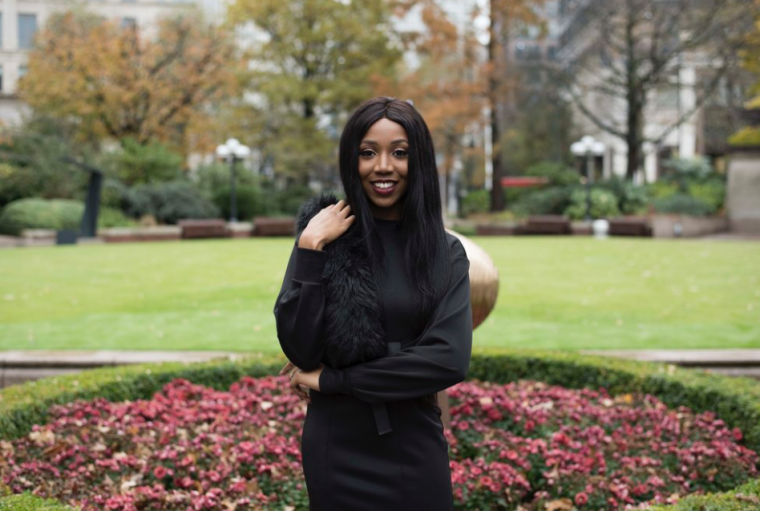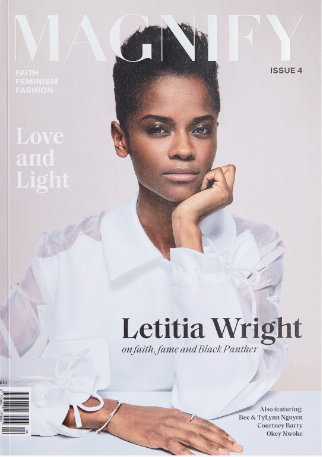Love Christ, love fashion: the Christian brand that's rewriting the rules
Young Christians ought to grow up wanting to be doctors or nurses, or – even better – ministers or missionaries. It's a well-known fact. What's the point, spiritually speaking, of – say – fashion?
That's a view Ruth Yimika Awogbade often came across when she was growing up with, and she rebelled against it. A churchgoer who didn't really question her faith, she'd grown up going to a girls' school where excellence was expected and she didn't see any reason why she shouldn't excel at what she loved.

For the last 10 years she's been editor of Magnify, a website and magazine aimed at women who are 'driven, passionate, probably work in the corporate or creative sector or the public sector, and who think about life deeply'. These women are successful, and like good clothes and the good life.
And they're also open to the big questions about life, meaning and eternity. The site – and the yearly magazine, a sumptuously-produced collection of features, interviews and and opinion pieces alongside beautiful clothes worn by beautiful people – is a gateway for thinking about faith.
This desire to communicate faith to a neglected demographic is what's driven Awogbade for the last 10 years. Her own Christianity was nearly derailed when she went away to Durham University – though the experience left her with a faith that was far more personal and real.
'I had three bereavements in shockingly quick succession,' she tells Christian Today. 'It was so quick it made me question my faith. I felt Christianity hadn't made a difference to what happened.
'I went to university only two weeks after I lost my uncle and I pushed God out of my life. I had no way to process what had happened.'
And, she reflects: 'The Christian responses were very hollow – they didn't show much emotional intelligence. We want to comfort people, but that can mean denying reality.'
When I came home, though, it was 'as if a light went on in my head. I had the kind of faith that was based on everything going well. But I'd seen my parents' individual relationship with God, and realised that was available to me.'
There was, she admits, a tension between her life growing up in church and her life outside. 'I went to an all-girls school that was very academic and driven. But when I went to church, women were expected to be meek and mild,' she says. 'There'd be guys at church who would want a wife who could support them. I was raised as someone who realised that women were equal.'
And she took her revitalised faith back to university with her – and it's out of this experience that Magnify was born.
'My vision from the beginning was that it would give women the opportunity to experience Christianity in every area of their life. It was very much shaped by my time at Durham.
'I wanted people to understand how a personal relationship with Jesus could make a difference to them.'
The culture she found there, she says, was based on 'arguing people into faith'. 'I wanted to tell stories of real people – you might disagree with what they believed, but you couldn't deny the experience.'
Aged only 19, she ran events for women aimed at connecting faith with real life, before moving into digital content of a kind she describes as 'pre-Alpha or Christianity Explored'. The idea was always to send people to their local church: 'From the beginning we really understood our place within the body of Christ and the fact that we can't do everything.'
Magnify is now a magazine, a blog and a monthly events programme. Its vision, claims its website, is 'to give women the chance to explore the Christian faith in an unpressured, engaging and creative way'. 'Our ultimate goal is to become much more than a print magazine, but rather a collective of like-minded and progressive individuals who are committed to improving the world through timeless human values,' it says.
As well as those beautiful pictures, the current issue of the magazine has articles on Christian feminism, how the church shapes culture, the power of forgiveness and dating. It also features interviews with movers and shapers within the creative, business and social media worlds – male and female. It's designed to engage the mind, as well as the eyeballs. Awogbade says the magazine is the 'icing on the cake' of the Magnify project. She works with more than 160 contributors – stylists, photographers, designers, writers – per issue, and loves it: 'For me I love being able to work with creatives and see them using their God-given gifts, even if they might not know their gifts have been given to them by God.'
And the expensively professional look pays off, with healthy sales helping to bankroll the enterprise. 'Women believe in us and want to sow into us. There's a gynaecologist who got tired of the trashy magazines in her surgery and bought 20 copies. There's a guy with a lot of work colleagues who are female. Talking about faith in the UK can be very intrustive and quite intimate. He said it was quite hard to talk to female colleagues about faith without seeming weird, but he took about 20 copies for his office.
'Things like that are very humbling because they show us that the vision God has called us to, he will provide the resources for, to help us reach more and more people.'
And the people in her sights are those driven, passionate, thinking women from their early 20s to their mid to late 30s.
'I have friends who are interested in meditation, in Buddhism, who are looking for something that will fill the void. Obviously as Christians we know what that is. But it's going to be the women who are thinking about life, not just at a surface level. They have dreams and aspirations, and they want to impact the world around them.'
And she's adamant that there's no contradiction between these different areas of their lives – and part of her mission is to bring worlds that have often been seen as separate back together again.
'For me, I always had an issue growing up with the idea that Christians see things like fashion as worldly or negative.
'I remember growing up we were encouraged as Christians to be charity workers or nurses or doctors, but no one would want to encourage people to be in fashion.'
But why not? 'We all have to wear clothes, we're all involved in the fashion industry up to a point,' she says. Why shouldn't God be as involved in that area of life – and glorified in it – as he is in every other?

'What we do is show people from a broad range of life and people who have come from all different backgrounds. For me, fashion is a way for me to express myself. I don't think that makes me any more worldly than someone who doesn't care what they wear.'
There's something very attractive about a whole-hearted celebration of beauty that sets it in the context of an equally whole-hearted devotion to God. Magnify isn't a sell-out to consumerism; rather, it engages with it. Awogbade says she worries that Christians can see the gospel as a sort of guarantee that God will somehow make all our dreams come true.
'It's really about minds transformed and realising that true joy comes in bringing glory to God,' she says.
And nothing about that is shallow or trivial, surely; it's about accepting the goodness and value of creation – and creativity.
For more about Magnify or to order copies click here.











